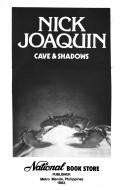Cave and Shadows
Cave and Shadows is a 1983[1] whodunit[2] and Martial Law era “metaphysical” thriller[3][4] novel written by Philippine National Artist Nick Joaquin. The setting of the novel is during Ferdinand Marcos’s martial law in the Philippines,[5][6] including the time in Manila when activism was alive and demonstrations were frequent before August 1972 (described as Joaquin’s “‘objective correlative’ to the Crisis of ’72”[4]), before the declaration of martial rule. It is a detective fiction that also deals with and arcane and historical cults involving beatas or “beatified women” (a group of religious lay women who were "repressed by a male-dominated, colonial order"[4]) and strange events occurring inside unfamiliar caves in the Metro Manila area. Other themes include politics, love, family, friendship, reconciliation, and tyranny.[2] One of two novels authored by Joaquin during his lifetime[4] (written twenty-two years after Joaquin’s The Woman Who Had Two Navels[4]), it is regarded as an important book[7] to read for Philippine literature students.[1] In this work, Joaquin interspersed historical facts and with fiction resulting to a mesh of “multi-layered meanings”.[1] One of the main concept for the plot is the “routinary paganisation” by Filipinos of the Western-rooted religion known as Catholicism.[8]
 Book cover for Nick Joaquin's Cave and Shadows. | |
| Author | Nick Joaquin |
|---|---|
| Country | Philippines |
| Language | English |
| Genre | Fiction |
Publication date | 1983 |
The bizarre events in this novel includes the inexplicable death of Nenita Coogan.[9] Coogan’s body was found naked inside a cave located within the suburban regions of Manila.[4] The death by Coogan triggered a criminal investigation, truth searching,[1] collision of the past and the present, and the unhinging of reality.[4] The end of the novel exposes human nature, belief, and certainty.[1]
References
- Cave And Shadows by Nick Joaquin Archived 2010-04-11 at the Wayback Machine, Contemporary Philippine Fiction, anvilpublishing.com
- Cave and Shadows by Nick Joaquin (born in 1917), Book Summary, portal.unesco.org
- Roces, Alejandro R. Regarding Nick Joaquin, Roses & Thorns, Opinion, The Philippine Star, philstar.com, November 10, 2009
- Cave and Shadows (1983) by Nick Joaquin Archived 2010-03-12 at the Wayback Machine, from the Biography of Nick Joaquin, The 1996 Ramon Magsaysay Award for Journalism, Literature and Creative Communication Arts, rmaf.org
- Cave and Shadows by Nick Joaquin, britannica.com
- Cave and Shadows by Nick Joaquin, britannica.com
- Other important books by Joaquin include: (...) Cave and Shadows, 1983 (...) Archived 2008-06-14 at Archive.today, nationalartists.panitikan.com
- Garcia, J. Neil C. (...) Depicting the routinary paganisation by Filipinos of the Western religion called Catholicism is not anything new in Filipino fiction, and indeed novels like Nick Joaquin’s Cave and Shadows have in fact made it the conceptual center of their plots. (...), from The Postcolonial Perverse: Hybridity, Desire, and the Filipino Nation in Federico Licsi Espino, Jr.'s Lumpen, Intersections: Gender, History and Culture in the Asian Context, Issue 14, November 2006, intersections.anu.edu
- San Juan, Epifanio Jr. Celebrating the Virgin and Her City: An Introduction to Nick Joaquin, philcsc.wordpress.com
- San Juan, Epifanio. Chapter 7: Cave and Shadows: Toward the Production of Utopian Discourse, Subversions of Desire: Prolegomena to Nick Joaquin, pages 169-189, books.google.com
External links
- Cave and Shadows Summary at valmar.wordpress.com
- Bookcover image for Nick Joaquin's Cave & Shadows at openlibrary.org